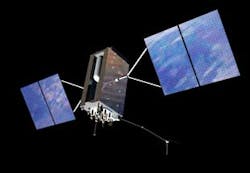Lockheed Martin captures contract to build GPS III satellites three and four
LOS ANGELES AFB, Calif., 12 Jan. 2012.Navigation satellite designers at the Lockheed Martin Corp. Space System Co. in Newtown, Pa., outside Trenton will build the third and fourth Global Positioning System (GPS) III navigation and guidance satellites under terms of a $238.5 million contract awarded Wednesday by the U.S. Air Force Space and Missile Systems Center at Los Angeles Air Force Base, Calif.
GPS-III satellites, which will replace aging on-orbit GPS satellites will improve satellite navigation accuracy improve the GPS satellite constellation's ability to resist attempts to jam their signals to degrade or disable the system's capability. The GPS-III satellites also will extend each satellite's design life and add a new civil signal that is interoperable with international global navigation satellite systems.
The GPS III program is part of a U.S. positioning, timing & navigation upgrade. The new GPS constellation will have 500 times the transmission power of the existing GPS system, and will have faster clock update rates.
The enhanced reliability and anti-jam features of the GPS III satellites is expected to benefit U.S. and allied military forces, which increasingly rely on satellite-guided munitions, as well as civilian agencies and private business. U.S. and European aviation authorities have big plans to base future commercial aircraft navigation and guidance on signals from the GPS and other satellite-based positioning systems.
Air Force officials plan to buy as many as 12 GPS II Block A satellites, as well as eight Block B satellites with cross-linking capabilities, and 16 Block C satellites that will have spot beams to enable operators to boost the power of satellite signals to 100 times greater than Block B satellites. This will enable the satellites to provide reliable service even in difficult or degraded conditions.
Also on Wednesday, Lockheed Martin announced a $21.5 million Air Force contract to provide launch-and-checkout capability (LCC) to command and control all GPS III satellites from launch through early on-orbit testing.
The LCC, which will be integrated into the Raytheon-developed Next Generation Operational Control System (OCX), will ensure launch availability for the first GPS III satellite in 2014. The LCC includes trained satellite operators and engineering solutions in partnership with OCX to support launch, early orbit operations and checkout of all GPS III satellites before the spacecraft are turned over to Air Force Space Command for operations.
The GPS III team is led by the Global Positioning Systems Directorate at the U.S. Air Force Space and Missile Systems Center. Lockheed Martin is the GPS III prime contractor with teammates ITT Exelis, General Dynamics, Infinity Systems Engineering, Honeywell, ATK and other subcontractors. Air Force Space Command's 2nd Space Operations Squadron (2SOPS), based at Schriever Air Force Base, Colo., manages and operates the GPS constellation for both civil and military users.
Lockheed Martin will do the work on GPS II satellites three and four in Newtown, Pa., and should be finished by January 2016. For more information contact Lockheed Martin Space Systems online at www.lockheedmartin.com/ssc, or the Air Force Space and Missile Systems Center at www.losangeles.af.mil.
About the Author
John Keller
Editor-in-Chief
John Keller is the Editor-in-Chief, Military & Aerospace Electronics Magazine--provides extensive coverage and analysis of enabling electronics and optoelectronic technologies in military, space and commercial aviation applications. John has been a member of the Military & Aerospace Electronics staff since 1989 and chief editor since 1995.
